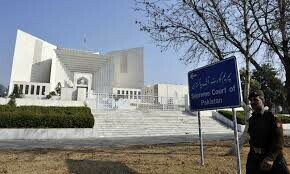With the death of veteran politician Mairaj Mohammad Khan in Karachi on Friday, the country has lost one of its most outspoken and courageous champions for democracy and the rule of law. By many accounts, personalities such as his that tower over their peers are few and far between in the modern political landscape.
A founding member of the PPP and a close associate of Zulfikar Ali Bhutto, Mr Khan started his political career as a student leader in the early years of the decade after Pakistan’s inception. Over the course of time, he braved state brutality on numerous occasions as well as over 13 years in prison cumulatively, during which he also faced several bouts of serious illness, including one that left him on a ventilator for months before life could be resumed as normal.
Read: Veteran politician Mairaj laid to rest
Originally from Khyber Pakhtunkhwa and hailing from the Afridi tribe, the ancestors of Mr Khan had pre-Partition been settled in Farukhabad, Uttar Pradesh (India). This is where he was born on Oct 20, 1938, his father being Hakim Maulvi Tajuddin, who is remembered for having taken part in the Khilafat Movement. The family pursued diverse interests; where one of Mr Khan’s brothers joined film journalism, another — Minhaj Barna — earned his laurels as a senior journalist and union leader of the profession, as well as with a long attachment with the Communist Party of Pakistan (CPP).
Post-Partition, Maulvi Tajuddin’s family settled in Quetta, which is where the young Mr Khan completed his Matriculation degree. Subsequently, he joined his elder brother Minhaj in Karachi, and took admission for further studies in S.M. Law College. His brother’s politics and the ideology of the left had a deep impression on him, to say nothing of his father’s encouragement that led to him being a fiery orator and paved the ground for participation in student politics.
This was the time when Gen Ayub Khan had imposed his brutal martial law and the CPP as well as the body affiliated with it, the Democratic Students’ Federation, had been banned. Hasan Nasir, a leader of the National Awami Party and member of the CPP, had allegedly been tortured to death during incarceration at the Lahore Fort. Mr Khan and his companions joined the National Students’ Federation (NSF), transforming it into a left-oriented party.
Under the leadership of Mr Khan, the NSF first took up the battle to challenge the dictatorship of Ayub Khan. Concurrently at the time, workers of the NSF were busy building public opinion against what was, in their view, the imperialistic power of the US. Then, in 1961, Patrice Emery Lamumba, the Congolese leader who was the first democratically elected leader of that country as prime minister, was assassinated. As the CIA came under suspicion for the killing, the NSF initiated a movement in protest. This failed to arouse much public support, and was brutally put down. Around the same time, though, communal riots broke out between Muslims and Hindus in the Indian city of Jabalpur, which again brought Mr Khan and his companions out on the streets.
Though also crushed by the police, these were well-attended protests. Mr Khan and several of his companions were arrested and sentenced to six months’ incarceration.
In 1963, the Ayub Khan government amended the university ordinance and increased the duration for degrees. This too sparked protest by the students movement, especially in Karachi. The government expelled a dozen Karachi students who were being led by Mr Khan; such was the position mounted by this group, however, that the government had to eventually accept the students’ demands — hence elevating the NSF into a significant political force.
It was around this time that communist parties at the global level bifurcated and in Pakistan, the NSF pro-China group was headed by Mr Khan, while the pro-Soviet Union faction was led by Amir Haider Kazmi. The former supported Fatima Jinnah against Ayub Khan in the presidential elections of 1965, as a result of which Mr Khan was arrested again. During this period, he was elected a member of ‘basic democracy’.
Over the decades to follow, the vagaries of politics in Pakistan took their toll of Mr Khan’s energies and convictions. He was in jail repeatedly during the Ziaul Haq dictatorship, and in 1981 became a key founder of the Movement for the Restoration of Democracy. More than 20 years later, in the late ’90s, he joined the Pakistan Tehreek-i-Insaaf but left soon after the turn of the millennium.
The Pakistan he struggled for may yet be long in the coming, but there is no doubt that with the loss of Mr Khan, the country’s political landscape is by far the poorer. Those who might seek to emulate his politics, however, could do no better than attempt to live up to that firebrand oratory and solid conviction, backed up as it was by the belief that transformation is possible.
Published in Dawn, July 23rd, 2016















































